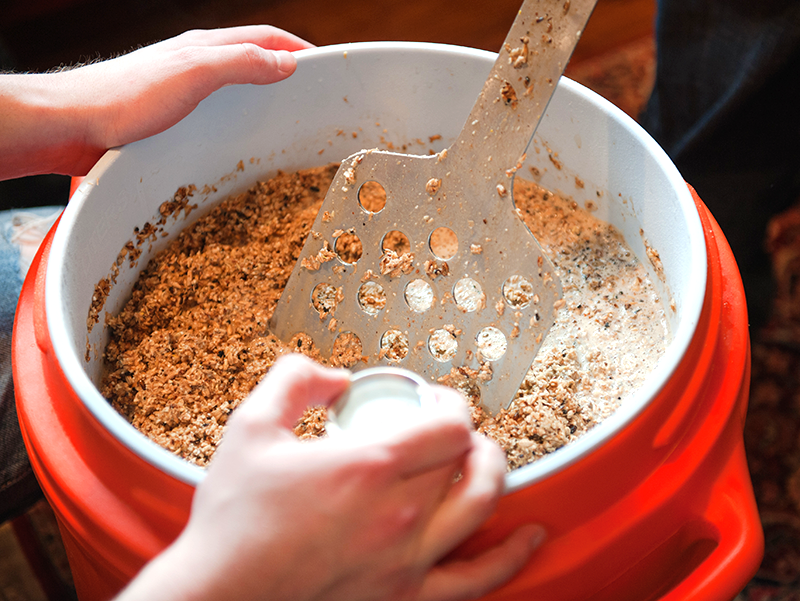 If you’re new to all-grain brewing, you may have heard about infusion mashing, step mashing, and decoction mashing techniques and wondered what all the fuss is about. Don’t let the jargon confuse you. These are just 3 all grain brewing methods you can use to mash your malted grains to extract fermentable sugar. (If you’re not ready for brewing all-grain yet, you may want to check out our Introduction to Partial Mash Brewing.)
If you’re new to all-grain brewing, you may have heard about infusion mashing, step mashing, and decoction mashing techniques and wondered what all the fuss is about. Don’t let the jargon confuse you. These are just 3 all grain brewing methods you can use to mash your malted grains to extract fermentable sugar. (If you’re not ready for brewing all-grain yet, you may want to check out our Introduction to Partial Mash Brewing.)
Let’s see if we can shed some light on the three mashing processes:
Single Step Infusion Mash
A single step mash is the most basic style of all grain mashing. It simply involves soaking the crushed grains in water at a steady temperature for a specified period of time. Most homebrewers mash for about 60 minutes, though in theory 30 minutes should do the trick.
This process, called conversion, allows naturally occurring enzymes in the grains to break down the starches into fermentable sugar. One of the cool things about mashing is that by controlling the temperature of the mash, you can change the fermentability of the wort. By mashing in the lower end of the temperature range (around 148°-152°F), you achieve a more fermentable wort, and ultimately a drier beer. Mashing your grains in the upper end of the spectrum (152°-158°F) creates a less fermentable wort and a sweeter beer. Since I don’t have a very advanced brewing system, I’m usually happy just keep the mash in the 150°-154°F ballpark.
Brewers have the option of raising the mash at the end for the mash out. Bringing the mash up to about 170°F will stop enzymatic activity and make it easier to run off the wort.
Multiple Step Infusion Mash
 This all grain brewing method is often used when brewers need to break down proteins in the malt. This is only necessary when using under-modified lager malts. Because under-modified haven’t germinated as much during the malting process, a protein rest is used to allow enzymes to break down proteins in the grain. In a protein rest, the mash is usually held at around 122°F for 15-30 minutes, and then the mash is raised to conversion temperature (the temperature at which starches are broken down into fermentable sugars). The protein rest generally improves head retention and reduces haze when brewing with under-modified malts and unmalted adjunct grains.
This all grain brewing method is often used when brewers need to break down proteins in the malt. This is only necessary when using under-modified lager malts. Because under-modified haven’t germinated as much during the malting process, a protein rest is used to allow enzymes to break down proteins in the grain. In a protein rest, the mash is usually held at around 122°F for 15-30 minutes, and then the mash is raised to conversion temperature (the temperature at which starches are broken down into fermentable sugars). The protein rest generally improves head retention and reduces haze when brewing with under-modified malts and unmalted adjunct grains.
Once again, brewers may want to raise temperature for mash out at the end of the multiple step mash.
Decoction Mash
Of the 3 all grain brewing methods mentioned here, decoction mashing is the most traditional brewing technique. It was developed by brewers who had a lack of temperature control. Brewers would remove a portion of the mash, boil it, and add it back into the mash. They might repeat this up to three times. These brewers found that the decoction process allowed them to bring the mash through each of the various rests and end up with a fermentable wort.
Today, since we have thermometers and other methods of temperature control, decoction mashing isn’t really necessary, though some brewing still use decoction mashing for brewing certain traditional styles.
So there you have it: Ales use single step mashing, lagers use multiple steps, and decoction mashing is an option for brewing certain traditional styles.
Which of these all grain brewing methods do you prefer?

My experience says if you are doing any experimenting of any kind in beer making—try ale first—–much easier and quicker to make and you can learn a lot—just remember you have to drink your mistakes…….I am growing my own hops—-very easy—–hops is almost a weed—beat it with a board to keep it from growing—-Please put your trelace in the middle of a lawn you can mow—it is very invasive. have been using a wheat malt for about a year—not too bad in ale—I have enough ground to try barley this year—let you know how this works.
My Brewers Best kits include one or two pounds of grains for a partial mash brew. They recommend 20 minutes or so of mashing at 150-165 deg F. I assume I could go significantly longer–30 minutes up to an hour–on this step. Am I interpreting this blog correctly?
One more question: what do you mean when you say bringing up the mash temp to 170 can “make it easier to run off the wort”? Thank you.
Frank, what we recommend doing when dealing with any beer kit is to follow the directions as written by the manufacturer so that your beer will turn out as intended. The are all tested by the manufacturer and altering the procedures could alter the end result. Also remember, when all-grain brewing you are dealing with much more than the one or two pounds of grain included in the brew kits, so the longer brew time is ok. Run off is the liquid separated from the grain. The higher temperatures will help the grains separate from the liquid.